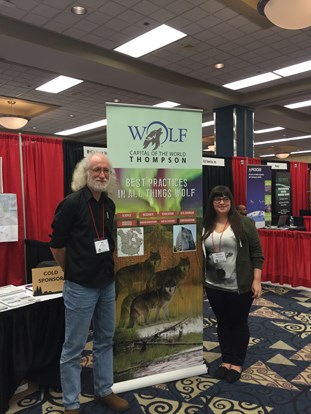Memorial University professor of human dimensions and wildlife resource management Dr. Alistair Bath was in Thompson Oct. 23 to lead participants including representatives of Spirit Way, Thompson Unlimited, the Boreal Discovery Centre and others in a workshop on developing a wolf centre of excellence in Thompson.
Bath had led two previous workshops on the same topic in Winnipeg over the previous two days, one during The Wildlife Society Conference that was held there from Oct. 17-21 and the other with interested professionals including beef producers and parks managers.
“The objective here, and he’ll explain, is to develop what, for us, a wolf centre of excellence is and there’s lots of ideas around the table,” said Volker Beckmann, Spirit Way volunteer project co-ordinator and one of 14 workshop participants. “The next step from here on will be developing the strategic plan and business plan to make this thing happen. He’s going to put you guys to work and put your brains in gear.”
Bath broke the participants up into groups and had them brainstorm ideas around what a wolf centre of excellence should and should not do, whether it should be a physical or virtual centre or a combination of both, and what the biggest obstacles were to developing such a centre.
Workshop attendees felt the centre should be objective and scientifically accurate, staffed by qualified experts and reflect indigenous values and culture, but not function as a political advocacy organization or develop false expectations for tourists interested in wolves who come to Thompson.
“We do have wolves in Thompson and we know that,” said participant Bruce Holmes, a forest manager with Manitoba Conservation and Water Stewardship. “But they’re not going to walk up to you and want to be petted. They’re here but they’re not social.”
Boreal Discovery Centre board member Penny Byer, one of two city councillors in attendance at the workshop along with Colleen Smook, said when it comes to managing visitors’ expectations, she thinks about a story she heard about a couple who came to Thompson expecting to find some activities related to wolves, but found that apart from a guided Spirit Way trail walk offered through the Heritage North Museum there were no other activities offered.
“They were quite disappointed so they went back to The Pas because they had relatives there to visit, too,” Byer said. In The Pas, the met up with former mayor Al McLauchlan who took out for some wolf calling. “They had more of a wolf experience in The Pas, they felt, than they did in Thompson.”
Byer said that’s why one of the important steps to take towards developing a wolf centre of excellence was to begin offering programming.
“We really need something that resembles programming whether it’s fast tracking the Boreal Discovery Centre or whether it’s having next summer during July and August, special tours that take you out to look for wolf scat or whatever,” she said. “We need something that’s programmed that goes on the website, goes in our tourism brochures. We need something and we need it soon.”
Obstacles towards developing a wolf centre of excellence in Thompson identified at the workshop included getting local buy-in and cultivating First Nations involvement as well as other factors like geography, though Bath said remoteness is not necessarily a deterrent.
“I would argue that Churchill is even farther away but seems to have made a go as the polar bear capital,” he said.
The difference between Churchill and Thompson, however, is that Churchill already offers polar bear and whale-watching experiences available for purchase.
“There’s no product ready yet,” said Beckmann. “There’s no product you could buy today.”
Spirit Way is working to change that, said Spirit Way president Marion Morberg.
“We’re doing our first formal tours here this summer and we have four dates in August 2016,” she said. “It’s called wolves, polar bears and whales and we’re in partnership with Frontiers North Adventures, that’s the Tundra Buggy people out of Churchill, and we are putting together a seven-day package. They’re selling it on their website. We’re selling it. It’s two days in Thompson, three in Churchill and a day in Winnipeg on either side.”
And while the obstacles identified are not insurmountable, some will take longer to overcome than others.
Smook said while it isn’t necessary to have the support of council to develop a wolf centre of excellence, getting them behind the project could be helpful. The best way to do that, she said, was to get the people of Thompson supporting it.
“We listen to what the community wants,” she said.
Bath says surveys conducted in Thompson by his master’s degree student Bonnie Bishops about people’s attitudes towards developing a wolf centre and a wolf economy show that support in principle exists. A survey of 384 people is most likely fairly accurate, he explained.
“It’s possible that we polled 384 people from this area here or maybe we polled 384 people from there and we’re totally wrong in how we’re representing the community,” he said. “But 19 times out of 20 you’re going to pull that sample from in here and you’re going to be accurate plus or minus five per cent.”
Even if a wolf centre is developed however, maintaining ties with the community is vital. Bath gave an example of when staff from the International Wolf Center in Ely, Minnesota went out in the community and posed as tourists looking for nearby wildlife activities to take part in, only to find that workers in local businesses never mentioned them.




